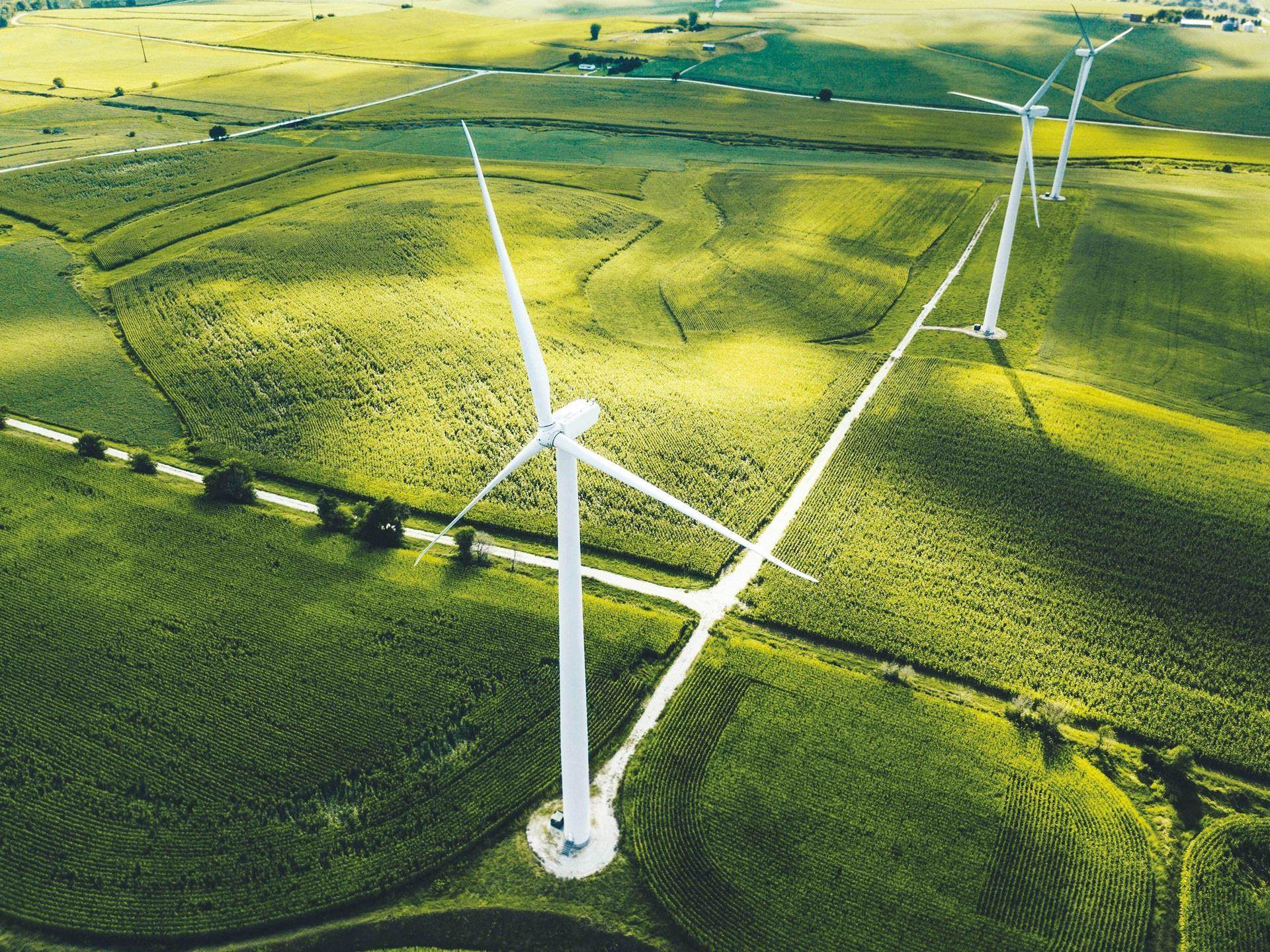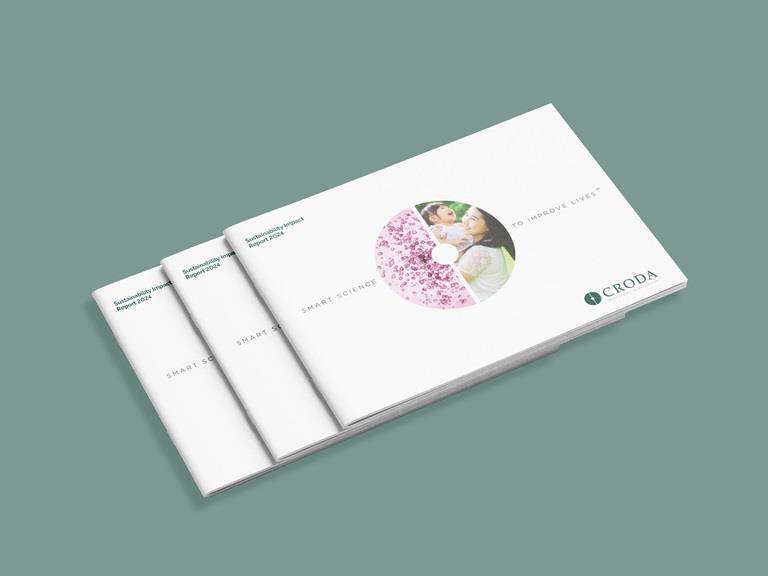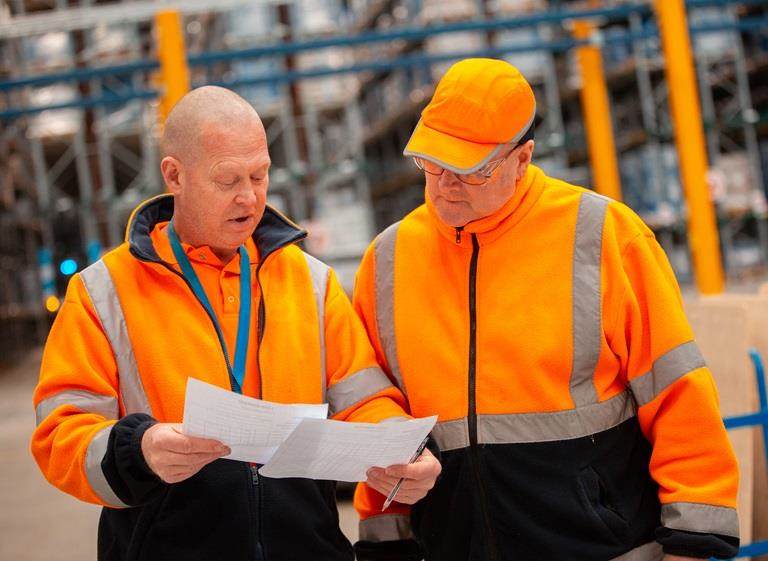
Accelerating towards a low-carbon future
Delivering greater impact
We are reducing our emissions in line with our verified SBT and working to deliver carbon saving in-use benefits throughout our supply chain.
Growing consumer demand for sustainable ingredients means our customers require transparency and the ability to deliver products with proven, substantiated claims on their environmental footprint, including carbon. Delivery against our decarbonisation roadmaps, through the switch to alternative energy sources and technology transformation, alongside the transition away from fossil towards an increasingly bio-based portfolio of ingredients, allows us to demonstrate quantifiable carbon reductions at a product level, to support our customers in meeting these consumer expectations. Developing products which offer benefits in use, including avoiding emissions, also support customers and consumers in living more sustainably and reducing their carbon footprint.
By becoming Climate Positive we will directly contribute towards the following UN SDG targets:
SDG 7.2, SDG 7.3,
Affordable and clean energy
SDG 9.4,
Industry, innovation and infrastructure
SDG 12.2,
Responsible consumption and production
SDG 13.2,
Climate action
SDG 17
Partnerships for the goals
Croda has announced updated climate goals that have been externally validated by the Science Based Target initiative (SBTi) and published on SBTi Target Dashboard. These targets science-based target conform with the SBTi Net-Zero Standard and the SBTI Forest, Land and Agriculture Guidance (FLAG). Croda has integrated these targets into our business strategies, not only reducing the environmental impact of our own operations but also helping customers advance our decarbonisation objectives.
Climate Positive: our world in 2030
Our progress
We will enable the transition to a low carbon economy. We will be Climate Positive, working closely with our customers to develop products that offer carbon saving benefits in use.
Our ingredients offer many sustainability benefits in use, including helping our customers and their consumers to reduce or avoid greenhouse gas emissions. Our Carbon Cover target means that by 2030 the use of our products will avoid four times the carbon emissions associated with our business.In 2024, our carbon cover ratio was 0.84:1 - the ratio of avoided emissions through the use of products attached to verified case studies
Downstream GHG emissions
Our carbon cover target aims to support customers in avoiding downstream emissions. The concept of avoided emissions is defined by the GHG Protocol as “emission reductions which occur outside of a product's lifecycle or value chain, but as a result of the use of the product” and often referred to as scope 4. Avoided emissions will be an important part of the net zero transition.
We have started thinking beyond our existing avoided emissions case studies to consider remaining downstream scope 3 emissions associated with the use of our ingredients and how further savings can be made. In better understanding and quantifying emissions in the three downstream scope 3 categories, we will collaborate with customers to identify innovative ways to reduce our shared downstream scope 3 emissions from today’s baseline.
For example, through:
• Consumer education and engagement to reduce energy consumption in use
• Supplying our ingredient in an alternative form, reducing customer processing emissions
• New product development to satisfy an unmet need, reducing use-phase emissions
Measuring the emissions associated with the end-of-life of used products will allow us to quantify, and our customers to realise, the benefits of our move to bio-based ingredients, avoiding the release of additional fossil carbon into the atmosphere. We have developed an industry-leading downstream Scope 3 inventory to understand our hotspots and impacts, enabling us to support our customers as they work towards becoming Net Zero (see page 11 of SIR 2023).
We will achieve our Science Based Targets (SBTs) by reducing our emissions in line with limiting the global temperature rise to 1.5ºC above pre-industrial levels, maximising the use of renewable energy in our operations.
Tackling the climate emergency is a global challenge and a priority for Croda.
By decarbonising our operations and supply chain, applying innovation, and delivering sustainable ingredients that provide benefits in use, we are also supporting our customers’ decarbonisation ambitions. Our leadership position means we can be a vocal advocate for the transition to net zero across our industry and beyond. Our leadership surrounding climate-related risks and opportunities was recognised by CDP as we scored A- in our 2024 climate disclosure. We have reduced our Scope 1 and 2 emissions by 28% since our 2018 baseline ahead of our interim milestone of a 25.2% reduction. While emissions have increased in 2024 following the challenging business environment in 2023, we remain on track to meet our SBTs aligned with 1.5oC, playing our part in transitioning to a low-carbon global economy.
Validation of our decarbonisation roadmaps
We reached a significant milestone in 2022 with every Croda location, including non-manufacturing sites, completing decarbonisation roadmaps demonstrating how they can achieve a 50% reduction in scope 1 and 2 emissions by the end of 2029.
Internal carbon price
Since 2020, we have applied an internal shadow carbon price to capex projects to help prioritise projects that will reduce scope 1 and 2 emissions, reducing their pay back periods. In 2022 we increased this price from £55 per tonne to £124 per tonne, in line with the UK Government’s Green Book, highlighting the increasing importance of climate action to avoid exposure to the cost of carbon and the importance we place on ensuring business growth without increasing GHG emissions, through zero scope 1 and 2 emission capacity and capability investments wherever possible.
Climate leadership: Product Carbon Footprint data
2022 has seen Croda working to automate the calculation of PCF data for all products from our top 13 manufacturing sites. This requires using activity-based costing data from our sites and includes the emissions associated with raw materials to calculate a cradle-to-gate footprint per product. The data has two main purposes:
- Internally, it will enable the sectors to make portfolio management decisions with carbon footprint as a datapoint, and will inform the next generation of low carbon products. The sector teams will be finalising 2030 decarbonisation roadmaps during 2023, going beyond the actions already being implemented at our manufacturing sites to include scope 3, and this information will be an invaluable part of that process.
- Externally, this data will be important for customers as they calculate and aim to reduce the scope 3 emissions associated with their raw material purchases. We will be able to provide a number that can demonstrate reductions since 2018, our baseline year, and show future reductions to support our customers’ supply chain SBTs.
Employee engagement
Engaging all employees in our decarbonisation programme is critically important to achieve our targets. We created a network of sustainability professionals across Croda who have come together to share best practice, understand plans and progress across the organisation, and support each other to deliver our Commitment. Hundreds of Croda employees, from engineers to procurement specialists, from bench chemists to account managers, have been directly involved in executing our Commitment and connecting it to helping our customers deliver on their sustainability strategies. We are now ready to launch our internal Sustainability Academy following successful pilots in 2024, to build the competence and confidence of our teams, and turn hundreds of engaged employees into thousands. Seventy-two low carbon sites make up 4% of our scope 1 and 2 emissions but employ 2,881 people, so taking visible actions at these sites is important to engage all employees in our decarbonisation journey.
Scope 3 emissions
Having developed an industry leading granular scope 3 inventory in 2021, we have committed significant effort to understanding GHG emissions in our value chain. We have developed a corporate scope 3 dashboard for quarterly reporting across the business, showing our upstream scope 3 categories. Our sustainable procurement team have developed a roadmap to achieve our scope 3 SBT. We have taken a layered approach, starting with supplier engagement and a supply chain review, with long-term greater impacts to be achieved through innovation and portfolio management led by the sectors, understanding that gathering primary data on carbon emissions attached to sourcing our raw materials is critical for quantifying the benefit of decarbonisation activities within our supply chain.
We will accelerate the transition to bio-based products, moving away from fossil/petrochemical feedstocks.
We have set an ambitious target for 75% of our organic raw materials to be bio-based by 2030. This transition away from petrochemical feedstocks through sustainable innovation has a positive climate impact, avoiding the release of additional fossil carbon into the atmosphere at the end of life of our ingredients. Our sustainable innovation strategy spans the transformational development of existing technologies and the discovery of alternative new solutions.
In the design phase of new product development, our research teams are working with supply chain experts, internally aiming to maximise the bio-based content of new developments well ahead of our portfolio target. In 2024, 56% of our organic raw materials were bio-based. We have missed our original 2024 milestone of more than 70% of our raw materials being bio-derived, primarily because we exited most of our Industrial businesses in 2022 and did not rebaseline the milestone. We are taking the opportunity now to consider the measurable carbon impacts of different non-virgin fossil raw materials, and consider how recycled and waste materials have a significant role to play in our future raw material portfolio.
In 2022 we committed to transitioning all ethylene oxide purchases to bio-based globally. Our transition to bio-based ethylene oxide (bio EO) is well developed in North America through the ECO range of 100% bio-surfactants. We are progressing well in Europe and Asia towards first bio EO usage in the coming year, with availability of bio EO increasing rapidly in several locations, catalysed by our public leadership position. In addition, where sources are less readily available, teams are investigating the use of ethylene oxide from recycled feedstocks, where upstream scope 3 carbon savings are possible.
Our sustainable innovation strategy also focuses on reducing the footprint of our ingredients during the full product life cycle by: increasing biodegradability; improving purity; and lowering the environmental footprint of products. This holistic approach ensures all aspects of a product’s life cycle are considered during the design phase. In the earlier discovery phase, new disruptive technology platforms and processes are being investigated to offer alternatives to some existing products, within a framework of safe and sustainable design.



